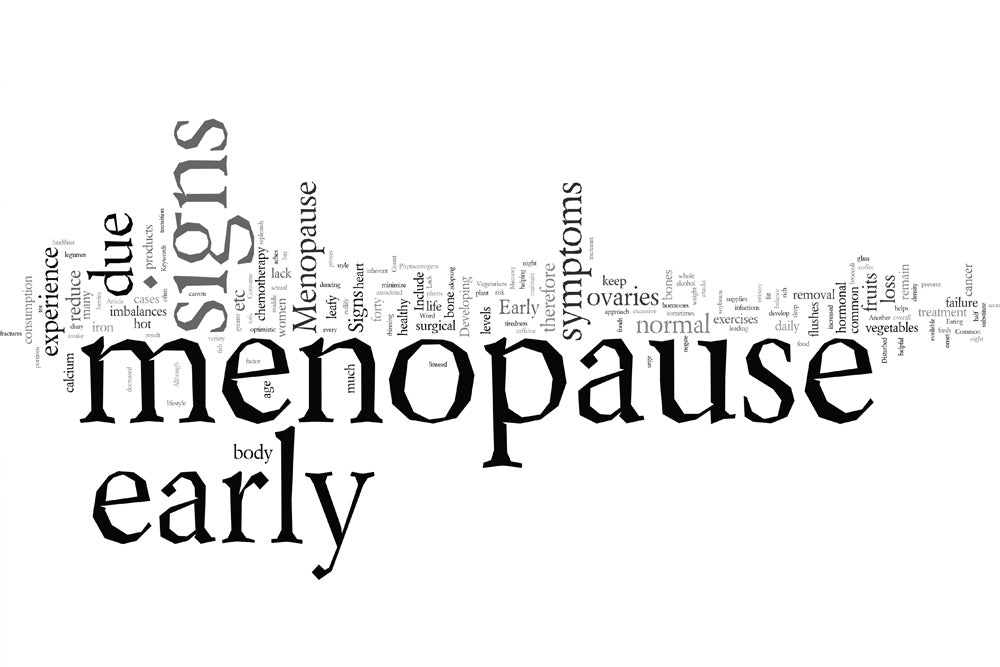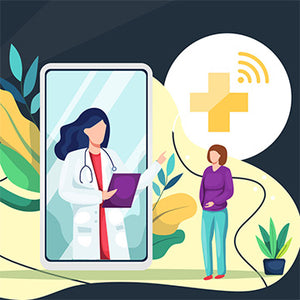
Symptoms of early menopause
A natural menopause is that stage when a woman stops having a menstrual period. Statistics indicate that most women experience natural menopause in their mid-forties to early-fifties. However, there are instances where the onset of menopause is triggered before this age and happens somewhere in the late 40s.
Early menopause is defined by the HSE as when your periods stop before the age of 45 and can occur because of various reasons such as genetics, surgery, and some medical treatments.
An induced or medical menopause may be recommended by your healthcare professional for a wide range of health concerns and is a common reason for medical intervention to reduce the age of menopause in women.
Of course, your GP is best positioned to give you specialist advice tailored to your own specific situation, but the aim of this guide is to help you understand some of the terminology and experiences associated with early menopause and how the management of an early menopause can be made easier with sound advice, an effective treatment plan and support on your journey through the Change of Life as it unfolds.
Potential Causes of Early Menopause
Premature menopause, also known as premature ovarian failure (POI), is a condition that happens to one in 100 women in the world, and most of the time, the initial symptoms include skipped irregular periods, low libido, and mood swings.
While most times early menopause happens with no apparent reason, there are a few factors that can put you at an elevated health risk when it comes to early menopause, which include the following:
Chemotherapy or radiation
Chemotherapy and other cancer treatments which involve the use of waves in the body pose a serious risk to the ovaries and uterine lining.
Chemo and radiation techniques use beams that kill dividing cells, some of which are pronounced in the ovaries. However, the damage to your ovarian cells will highly depend on the dosage and type of treatment.
In some cases, women may develop premature menopause symptoms after a few months of chemotherapy. Others might get it after years of treatment, while some won’t get it at all.
Autoimmune disorders
Studies have linked a couple of autoimmune diseases to premature menopause.
Thyroiditis, an inflammation of the thyroid gland, and Addison’s disease (adrenal glands producing too little hormones) have all been known to have an increased risk of early menopause.
How? Well, if you have either of these conditions, the immune systems may start to attack your follicles causing primary ovarian insufficiency.
Genetics
One common genetic disorder associated with early menopause is Turner Syndrome. For the ovary to function properly, it needs two X chromosomes and people with Turner Syndrome only have one.
Fragile X syndrome is also another genetic factor that leads to premature ovarian failure. It is a form of intellectual impairment and when it mutates, it brings up issues with your ovaries. Reports from the National Institute of Health in the US have found that Fragile X syndrome accounts for one in 33 women with early menopause.
Smoking and Toxin Exposure
Scientific studies have shown that smoking and other toxins from pesticides onsets primary ovarian insufficiency and causes early menopause. The chemicals in these harmful drugs go straight to the ovarian primordial follicles.
Tobacco toxins are also believed to reduce oestrogen levels in the body. Other studies have also confirmed the link between smoking and menopause. It’s never too late to nip this bad habit in the bud, and we’ve got some excellent smoking cessation products to help you quit and our pharmacists are here to support you on your journey.
Premature menopause has also been linked with other factors including:
- Obesity
- Epilepsy
- Lack of exercise
- Psychiatric disorders
- Rare medical conditions
Signs and Symptoms of Early Menopause
Menopause generally starts in your late 40s up to 55 years. However, premature menopause can occur quite early and some women in their late 30s have reported symptoms of premature menopause. These symptoms are not the same and will vary across individuals.
Perhaps the most common sign of premature menopause is irregular periods. They may become longer or shorter depending on the frequency.
There are, of course, many other symptoms of premature or early menopause similar to natural menopause such as:
- Heavy bleeding
- Hot flashes
- Insomnia
- Sleeping difficulty
- Night sweats
- Mood swings
- Low sex drive
If you notice any of the above symptoms, it is crucial to see a doctor or Obstetrician/Gynaecologist (OB-GYN) and get checked.
The symptoms may seem to indicate premature menopause, but it is important to confirm so that you rule out any underlying illnesses.
When you visit the doctor, you’ll most likely undergo a number of tests and diagnosis methods.
Diagnosis
Early menopause may be onset due to several factors and to be sure, a visit to the local GP is highly advised.
Your doctor will perform a number of tests to confirm premature menopause, but the most common is usually to confirm whether you've gone 12 consecutive months without periods and no other conditions can explain this.
In such cases, the doctor needs to carry out other common tests which may include:
- Two tests to confirm the levels of Follicle Stimulating Hormone (FSH). Early menopause is assumed when the levels are below 40IU/I
- Oestradiol test (E2)
- Pregnancy test
- Prolactinis the hormone that induces breastfeeding, but when at high levels, it stops the menstrual cycle.
- Transvaginal ultrasound uses ultrasound to check the vaginal area and if the ovary is functioning. Doctors will check for ovarian insufficiency (volume of ovaries), the thickness of the uterine lining, the size of follicles and eggs, and any blockage that may stop the menstrual flow.
After these tests are complete, your GP may have to do additional tests to confirm if there are any underlying conditions.
Some of these include:
- Bone density (DXA)
- Thyroid function
- Adrenal antibodies
- Cholesterol and blood sugar levels
- Chromosomal testing
Post Diagnosis
Ensure you find a medical professional that you are comfortable with who listens to you, understands and is sympathetic to your case to advise on how best to adjust to the early menopausal symptoms you’re facing.
They will help counsel you, give appropriate treatments, and at times, refer you to other practitioners specialised in this field. As it is a very niche area, you will most likely be referred to a gynaecologist, endocrinologist, or obstetrician-gynaecologist for further medical support.
Your doctor(s) should be able to monitor you throughout the process and regularly check your health status including routine tests for any health risk. Having a team of supportive health advisors on your side is ideal because you will have more than one diagnosis and source of help, which can help pinpoint any persistent or emergent problems more easily if and when they arise.
Cardiovascular Health and Early Menopause
There are studies that suggest women experiencing premature ovarian failure or early menopause are more likely to develop heart disease than women who have natural menopause. While this report remains somewhat controversial, other studies have linked early menopause with stroke.
This can be associated with the fact that sudden loss of oestrogen levels in the blood vessels can affect younger women more than those closer to the perimenopausal stage.
The best way to avoid such complications is to follow a healthy lifestyle. Stop smoking, eat a balanced diet, do more exercise, and maintain healthy body weight where possible.
Some studies suggest that menopausal hormone therapy can reduce the health risks associated with heart disease and premature menopause.
Treatment
Most of the time, women do not require treatment for premature ovarian failure, but in some cases, there are options available.
If you have premature menopause along with other menopausal symptoms that may suggest underlying conditions, further tests will determine the type of medical treatment you’ll get.
Menopausal hormone therapy (MHT)
If premature menopause occurs at the age of 40 or below, a course of hormone therapy (MHT) is sometimes recommended. It is a treatment process that induces the brain to produce oestrogen which a woman loses during menopause.
Hormone therapy also allows women to maintain better health and well-being by preventing risks associated with vaginal health, osteoporosis, and heart disease.
Like any course of medical intervention, MHT has a number of side effects including an increased risk of thrombosis or breast cancer. If you are unsure of your condition, speak to your doctor to get the appropriate advice.
You can also reduce the effects of premature menopause through the following options:
- Natural and herbal therapies
- Lifestyle changes
- Exercise and physical activity
- Cognitive behavioural therapy
- Hypnotherapy for hot flushes
- Menopause support medications
Managing Symptoms of Premature Menopause
Currently, there is no approved way to reverse premature menopause but early treatments can help manage the symptoms and or stunt their progression.
Managing both the physical and emotional effects of menopause can be upsetting especially if you don’t have someone to talk to.
Typically, your doctor should be the first person you talk to when having any emotional or physical symptoms.
Your doctor should be able to:
- Monitor vitals and symptoms during therapy
- Check for bone density
- Asses for any development of other conditions during the process
- Monitor heart and check any heart disease risks
Early menopause is known to cause vaginal dryness which can affect your sex life. More often, it causes dyspareunia (painful sex). You can reduce this feeling by using over-the-counter lubricants or vaginal gels such as Relactagel.
Also, premature menopause can adversely affect your moods and it is important to be aware of this fact. If you understand how your mood changes, then you’ll be able to address your relationships with friends, family, and loved ones and seek the support you deserve.
The Meaghers Verdict on Early Menopause Symptoms
A woman going through premature or early menopause will have signs and symptoms of menopause at an age younger than normal. This will certainly affect them both physically and emotionally. Seeing a doctor is the first port of call whenever such symptoms arise as they will help you manage and cope with this process in a safe and structured manner.
While there's an abundance of treatment options to help you cope with early menopause, doctors will most likely prescribe drugs that will help you manage early menopause.
If you don’t have any other underlying conditions, over-the-counter medications such as Menopace, Menomin, A. Vogel Menopause Support and other vitamin supplements might be of help and we're strong advocates of Revive Meno Active for anyone experiencing early menopause to help improve their quality of life.
However, before taking any solution (conventional or herbal) it's important to consult your GP first. It is very easy to develop complications when taking drugs without knowing how your body will react to them.
Contact Us to Discuss Your Menopause Health
We hope this guide has armed you with the knowledge required to understand some of the complications associated with early menopause and some potential courses of action you can avail of to relieve and comfort you throughout the process.
We want you to know that you're not alone on this journey and expert help is on hand to assist you should you require it.







